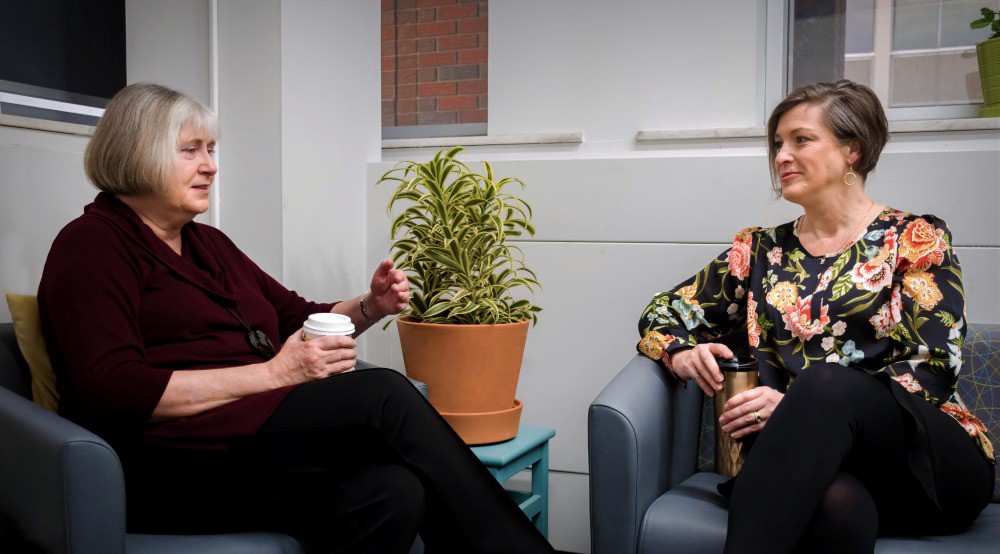
"What were you doing in there?"
Early in her career a colleague asked Kathryn Chandler this question after he viewed her class through a window and noted that she had students seated in a circle, passing an object from one person to the next. Kathryn was new to teaching and the class format was far from the more common lecture style of the time, so at that moment she felt like she was being judged. Her response was to request a classroom without windows. Looking back she wishes she had started a conversation instead.
Why wouldn't we talk about teaching? Like Kathryn suggests, it can be scary because for many instructors, teaching is a private activity between them and their students. They only talk with trusted colleagues about their experiences, good or bad. But talking about teaching is one of the most important things we can do to grow as instructors. Conversations help us reflect, contextualize, and analyze experiences, which fosters an intentional and scholarly approach to our teaching (Healy, 2000). Conversations also energize our efforts and affirm our commitment to teaching.
In research as well as teaching, academics tend to have very small networks of trusted colleagues with whom they test ideas and get feedback on their work in progress; in research this network might be as few as 10 individuals (Becher and Trowler, 2001), and in teaching even less, sometimes none (Roxå and Mårtensson, 2009). However teaching networks are especially important because for many of us, we come to the classroom with minimal or no formal training in pedagogy. Thus, we learn to teach primarily through trial and error, through critical reflection on our teaching, and through interactions with our colleagues. There is also a growing body of scholarship on teaching and learning in higher education to inform our practice - another form of conversation. The key ingredient to any teaching conversation, whether informal with trusted colleagues or formal through scholarship, is inquiry: an openness to challenging norms and assumptions, and a willingness to learn.
How might Kathryn's reaction have been different if that question, "What were you doing in there?", had been asked with a genuine interest in her teaching approach, why she was using it, and how she knew it was working? She and her colleague might have discussed, debated, and visited each others' classes. They might have drawn other colleagues into the debate, gathered students' perspectives, conducted some literature review. If they still had questions, they might even have conducted formal research investigations to better understand how their teaching approaches were facilitating student learning (or not). It could have been very interesting and their colleagues would have learned from those conversations as well.
So let's get talking.
How can you start the teaching conversation?
- Share a story of your teaching with a colleague and ask them a question about theirs
- Start a teaching community of practice in your workplace
- Attend a CTL workshop
- Seek out a mentor in your faculty or a peer consultant through CTL
- Consider being a mentor or a peer consultant
- Present at or just attend the Festival of Teaching and LearningFestival of Teaching and Learning (May 4, 2018)
No matter the size of their teaching network or the boundaries around their teaching conversations, instructors can expand both at the Festival of Teaching and Learning, Friday May 4th. This annual event encourages all members of the U of A community to share, demonstrate, explore, and debate the craft and scholarship of teaching. Proposals are due Friday March 2. Find out more here by visiting the Festival of Teaching and Learning website.Festival of Teaching and Learning website.
If you would like feedback before submitting a proposal for the Festival of Teaching and Learning, request a consultation from CTL.request a consultation from CTL.
Further Reading
Becher, T., & Trowler, P. (2001). Academic tribes and territories: Intellectual enquiry and the culture of disciplines. McGraw-Hill Education (UK).
Healey, M. (2000). Developing the scholarship of teaching in higher education: a discipline-based approach. Higher Education Research & Development, 19(2), 169-189.
O'Meara, K., Terosky, A. L., & Neumann, A. (2008). Faculty careers and work lives: A professional growth perspective. ASHE higher education report, 34(3), 1-221.
Roxå, T., & Mårtensson, K. (2009). Significant conversations and significant networks-exploring the backstage of the teaching arena. Studies in Higher Education, 34(5), 547-559.
Kathryn Chandler - Practicum Coordinator, Department of Human Ecology
Kathryn is the Practicum Coordinator in the Department of Human Ecology, an award winning teacher, and a Peer Teaching Consultant with the Centre for Teaching and Learning. She strives to cultivate rewarding local, national and international practicum placements that help students build their professional skills and connections. Kathryn also teaches senior professional practice courses and coaches students as they complete their practicums. Her goal with teaching is to create inclusive and caring learning environments that foster a sense of community and self-discovery.
Janice Miller-Young - Director of the Centre for Teaching and Learning
Janice is Academic Director of the Centre for Teaching and Learning and a co-chair of the 2018 Festival of Teaching and Learning steering committee. She has over 15 years' experience as a teacher of both large and small classes in engineering and general education. Her research interests focus on the Scholarship of Teaching and Learning (SoTL), specifically, the development of SoTL as a practice, and helping students increase their learning by making certain concepts and thinking processes explicit and narrowing the gap between novice and expert thinking.